Books
Books
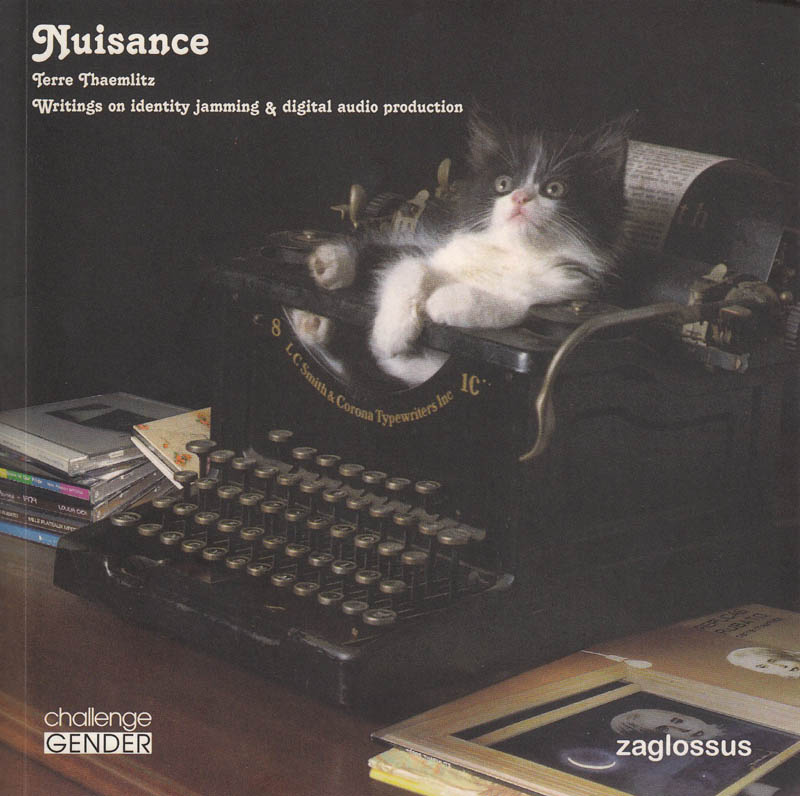
Nuisance
Nuisance compiles articles, essays, lecture transcripts, album annotations and other texts written by queer audio producer and writer Terre Thaemlitz between 1996 and 2015.
The overall theme uniting the texts is a defense of pessimism and a critical rejection of the incessant optimism lurking at the core of virtually all media – even in the “critical fields” themselves, where it reflects our conformity to those First World humanist and capitalist practices we wish to critique.
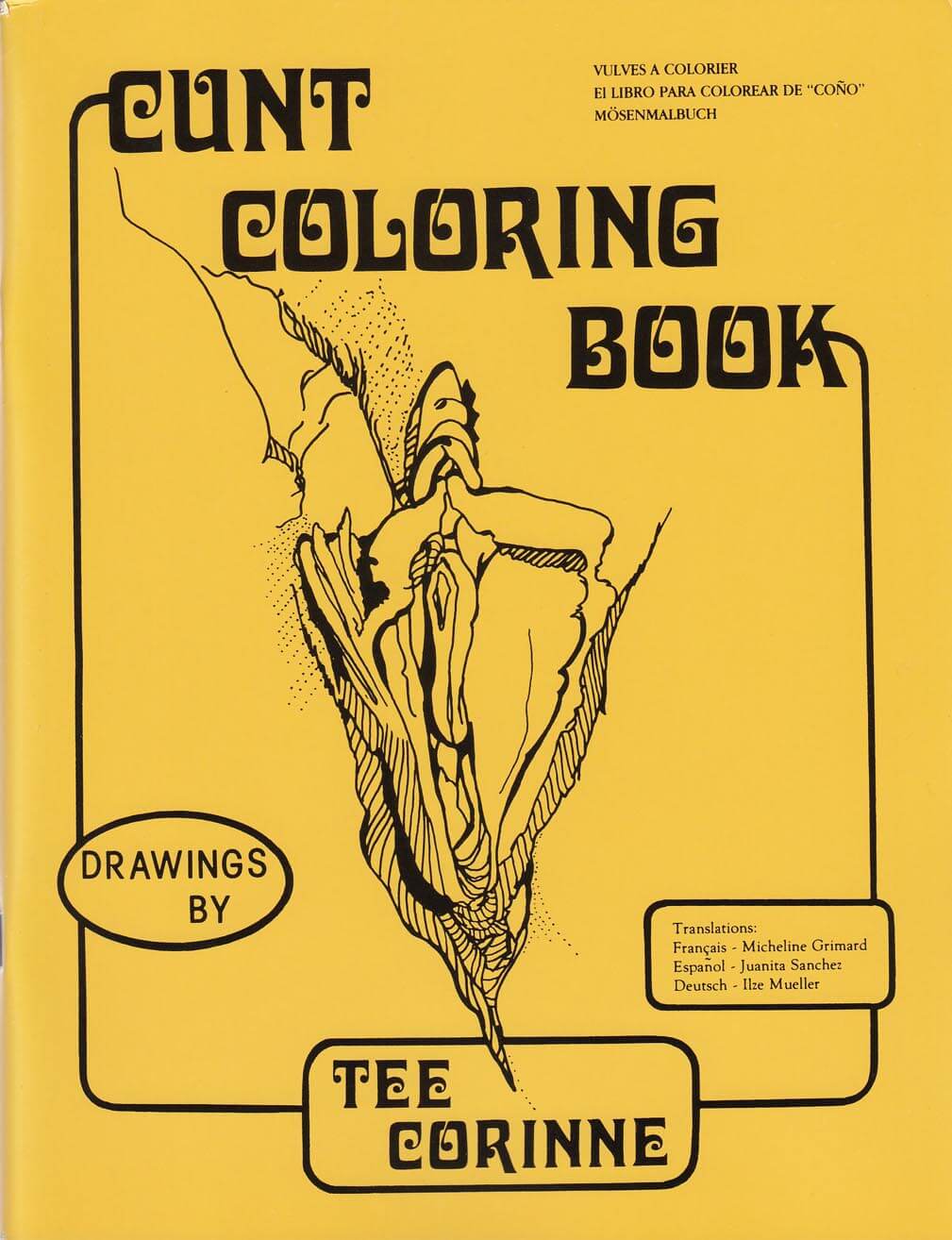
Cunt Coloring Book
Over three dozen c**ts of every size and description for you to color. Originally used for a sex-education class. Crayons not included. First published in 1975 by lesbian activist and artist Tee Corinne.
"In 1973 I set out to do drawings of women’s genitals for use in sex education groups. I wanted the drawings to be lovely and informative, to give pleasure and affirmation. I organized the drawings into a coloring book because a major way we learn to understand the world, as children, is by coloring. As adults many of us still need to learn about our external sexual anatomy." —Tee Corinne
Tee Corinne was born November 3rd, 1943 and grew up in St. Petersburg, Florida. Her mother, also an artist, introduced her to the creative principles and techniques that would serve her all her life. She received a B.A. in printmaking and painting from the University of South Florida, then went on to get an M.F.A. in drawing and sculpture at Pratt Institute, graduating in 1968. Afterwards she taught for many years, traveled through Europe, and finally became enmeshed in the back-to-the-land movement and communal living. After nearly ten years of marriage to a man she referred to as her "best friend," Corinne came out of the closet amidst severe depression in 1975. The strength to accomplish this difficult effort would later propel her to heights and achievements that would distinguish her as "one of the most visible and accessible lesbian artists in the world." From the mid-1960’s to the day she died Corinne created, published, and exhibited her art and writing around the world. She was a co-facilitator of the Feminist Photography Ovulars and a co-founder of The Blatant Image, A Magazine of Feminist Photography. She was the author of one novel, three collections of short stories, four books of poetry and numerous arts publications. In 1980, she was one of ten selected artists invited to have their work exhibited in the Great American Lesbian Art Show. The world lost Tee Corinne to cancer in 2006.

Apokolypse of the praktikal moment
Starship Magazine #19 presents contributions by John Boskovich, Elijah Burger, Simon Denny, Cornelia Herfurtner, Yuki Kimura, Vera Palme, Nora Schultz, Jack Smith; and by Rosa Aiello, Carter Frasier, María Galindo, Samuel Jeffery & Daniel Herleth, Elisa R. Linn, Paul B. Preciado, and Haytham El-Wardany
introducing new columnists: Mihaela Chiriac, Michèle Graf & Selina Grüter, Julia Jung, The Parliament of Bodies, and Ulla Rossek
and our columnists: Tenzing Barshee, Gerry Bibby, Mercedes Bunz, David Bussel, Eric D. Clark, Jay Chung, Hans-Christian Dany with Valérie Knoll, Francesca Drechsler, Stefanie Fezer & Vera Tollmann, Julian Göthe, Karl Holmqvist, Stephan Janitzky, Jakob Kolding, Lars Bang Larsen, Ariane Müller with Huang Rui, Robert M. Ochshorn, Mark von Schlegell, Max Schmidtlein, Amelie von Wulffen, and Florian Zeyfang
and artworks by Melvin Edwards, Elizabeth Ravn, Nong Shoahua, and Mark van Yetter.

The Crying Book
A young poet on the cusp of motherhood shares a scientific, cultural, and artistic examination of why and how people cry and what crying means. Heather Christle has just lost a dear friend to suicide and must reckon with her own struggles with depression and the birth of her first child. How she faces her joy, grief, anxiety, impending motherhood, and conflicted truce with the world results in a moving meditation on the nature, rapture, and perils of crying—from the history of tear-catching gadgets (including the woman who designed a gun that shoots tears) to the science behind animal tears (including moths who drink them) to the fraught role of white women's tears in racist violence.
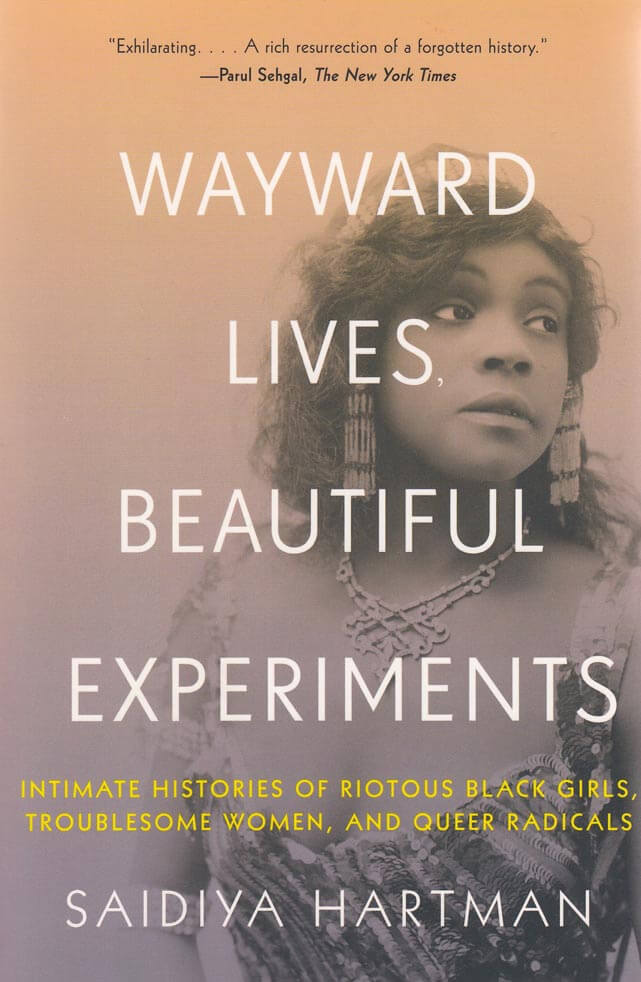
Wayward Lives, Beautiful Experiments
Wayward Lives, Beautiful Experiments examines the revolution of black intimate life that unfolded in Philadelphia and New York at the beginning of the twentieth century. In wrestling with the question of what a free life is, many young black women created forms of intimacy and kinship indifferent to the dictates of respectability and outside the bounds of law. They cleaved to and cast off lovers, exchanged sex to subsist, and revised the meaning of marriage. Longing and desire fueled their experiments in how to live. They refused to labor like slaves or to accept degrading conditions of work. Here, for the first time, these women are credited with shaping a cultural movement that transformed the urban landscape. Through a melding of history and literary imagination, Wayward Lives, Beautiful Experiments recovers these women's radical aspirations and insurgent desires.

Unleashed
05/09/04 Now she is blogging. Now she is sitting on the black couch listening to the sirens wail and the rain fall. Now she is thinking of oysters. Now she is wondering why this is worth sharing. Now she is thinking, how decipher what is worth reading? Who is to say? Sifters. She thinks we have become a nation of sifters. So began a three-year experiment in blogging. An experiment begun for many reasons—a way for an expat to keep in touch with fellow Canadian writers and artists, a way to come to terms with the increasing relevance of the internet in literary lives, and a way to figure out why, after decades of gains, women writers are still grossly underrepresented in critical dialogues.
With an afterword by Vanessa Place.

Parrhesiades Vol. 1
Parrhesiades is a multi-platform project, established in 2019 by curator Lynton Talbot to work with artists for whom language, either written spoken or otherwise performed is an essential part of their practice. Together with the artist, parrhesiades develops a single new work that exists across multiple platforms. With contributions by Quinn Latimer, Sung Tieu, Jesper List Thomsen, Elaine Cameron-Weir, Johanna Hedva, Eva Gold and Cally Spooner.

Making Connections
Kate Ellison, Merril Mushroom and 1 more
Making Connections is the fifth issue of Sinister Wisdom's series of work edited by the Southern Lesbian Feminist Activist Herstory Project, documenting the vital lesbian-feminist activism that proliferated in the US South during the 1970s, 1980s, and 1990s. Making Connections details the extensive networking of lesbian booksellers, publishers, writing groups, and newsletter through engaging interviews, first person narratives, and innovative graphic timelines.
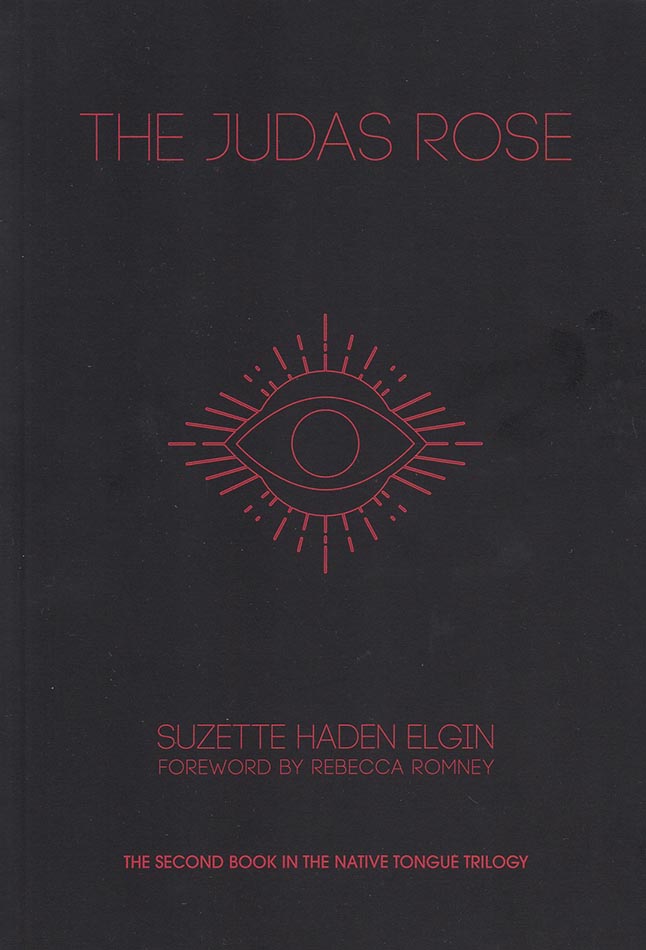
The Judas Rose
In the second volume of the Native Tongue trilogy, the time has come for Láadan—the secret language created to resist an oppressive patriarchy—to empower womankind worldwide. To expand the language’s reach, female linguists translate the Bible into Láadan, and a group of Roman Catholic nuns are tasked to spread the language. But when outraged priests detect their sabotage, they send a double agent to infiltrate and destroy the movement from the inside.
With a foreword by Rebecca Romney
Suzette Haden Elgin (born Patricia Anne Wilkins; 1936–2015) was an American science fiction author. She founded the Science Fiction Poetry Association, and was considered an important figure in the field of science fiction constructed languages. Elgin was also a linguist; she published non-fiction, of which the best-known is the Gentle Art of Verbal Self-Defense series.
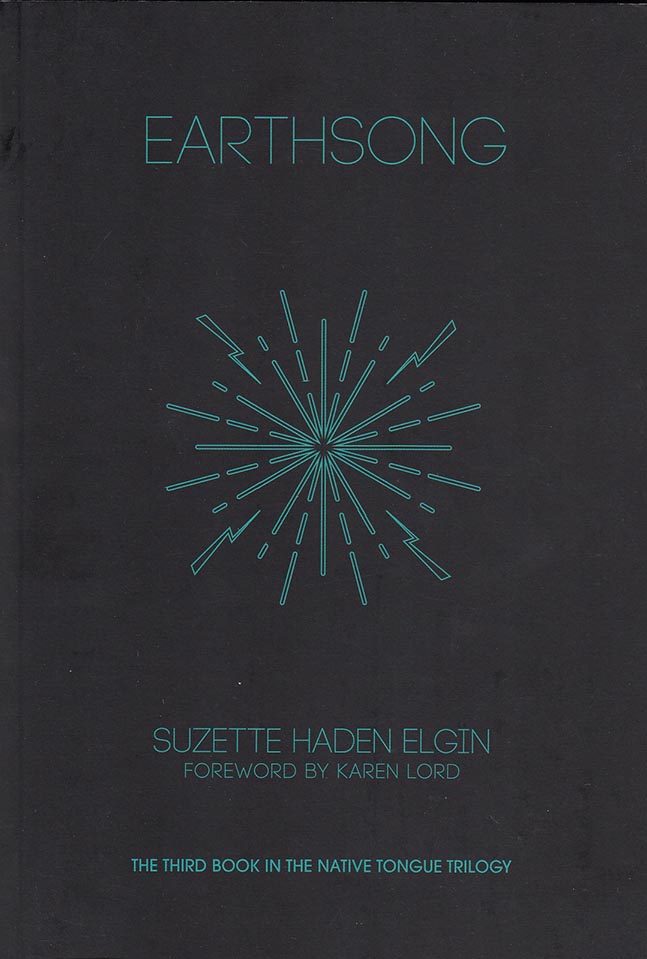
Earthsong
The final book in the Native Tongue Trilogy.
The interstellar Consortium of Planets has forsaken the irredeemably violent Earth, condemning the planet to economic and ecological chaos. As the Consortium prepares to euthanize the planet, women freedom fighters are offered one last chance to correct men’s brutal nature and stop the planet’s annihilation. In the stunning conclusion to the Native Tongue trilogy, female linguists must once again come forward to ensure the survival of humanity.
Suzette Haden Elgin (born Patricia Anne Wilkins; 1936–2015) was an American science fiction author. She founded the Science Fiction Poetry Association, and was considered an important figure in the field of science fiction constructed languages. Elgin was also a linguist; she published non-fiction, of which the best-known is the Gentle Art of Verbal Self-Defense series.

Dodie Bellamy Is on Our Mind
Anthony Huberman, Jeanne Gerrity
Examining the genre-bending writing of Dodie Bellamy, whose work has focused on sexuality, politics, feminism, narrative experimentation, and all things queer.
Dodie Bellamy Is on Our Mind is the first major publication to address Bellamy's prolific career as a genre-bending writer. Megan Milks made several trips to San Francisco in order to spend time with Bellamy and craft a provocative and fascinating profile of the writer. Originally delivered as a lecture at the Wattis Institute, Andrew Durbin's text takes the form of a personal essay, expertly weaving anecdotes of his own encounters with Bellamy's writing with insights into broader themes in her work. Academic Kaye Mitchell takes a close look at the role of shame and its relationship to femininity in particular texts by Bellamy. And Bellamy and her late husband Kevin Killian offer deeply personal, emotionally wrenching ruminations on topics from the mundane (drawing) to the profound (mortality). These texts, alongside archival photos and a complete bibliography make, this book an important compendium on Bellamy.
Dodie Bellamy (b. 1951, in North Hammond, Indiana) has lived and worked in San Francisco since 1978. A vital contributor to the Bay Area's avant-garde literary scene, Bellamy is a novelist and poet whose work has focused on sexuality, politics, feminism, narrative experimentation, and all things queer. In her words, she champions “the vulnerable, the fractured, the disenfranchised, the fucked-up.”
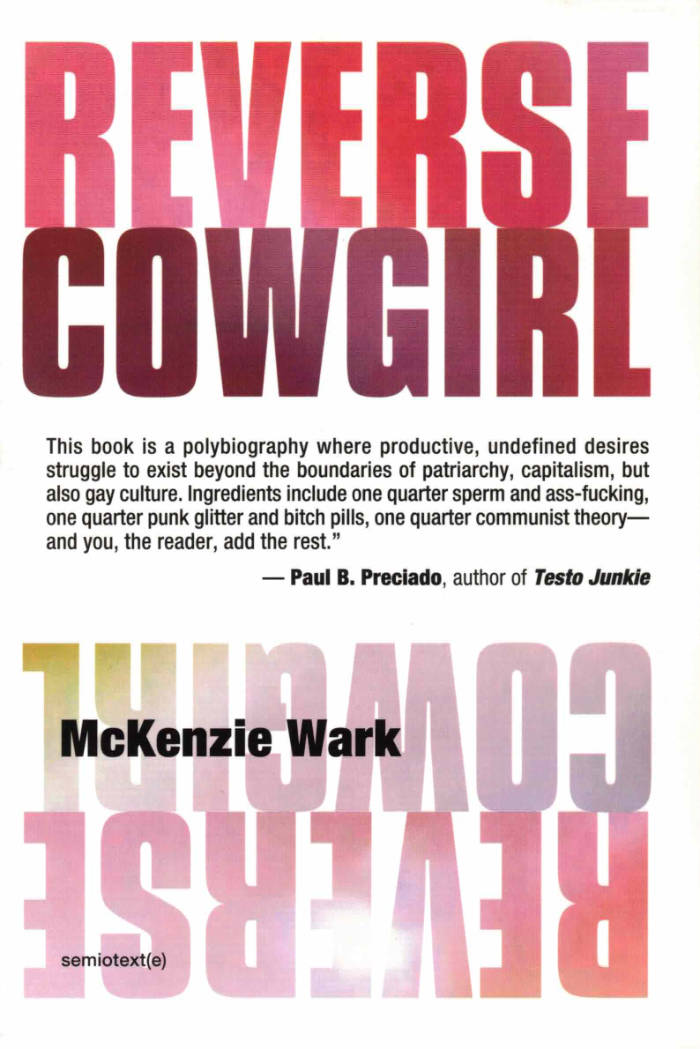
Reverse Cowgirl
McKenzie Wark invents a new genre for another gender: not a memoir but an auto-ethnography of the opacity of the self.
Another genre for another gender.
What if you were trans and didn't know it? What if there were some hole in your life and you didn't even know it was there? What if you went through life not knowing why you only felt at home in your body at peak moments of drugs and sex? What if you expended your days avoiding an absence, a hole in being? Reverse Cowgirl is not exactly a memoir. The author doesn't, in the end, have any answers as to who she really is or was, although maybe she figures out what she could become.
Traveling from Sydney in the 1980s to New York today, Reverse Cowgirl is a comedy of errors, chronicling the author's failed attempts at being gay and at being straight across the shifting political and media landscapes of the late twentieth century. Finding that the established narratives of being transgender don't seem to apply to her, Wark borrows from the genres of autofiction, fictocriticism, and new narrative to create a writing practice that can discover the form of a life outside existing accounts of trans experience: an auto-ethnography of the opacity of the self.

Engagement Arts Zine #1
First edition of the Engagement Arts Zine.
Published May 2019
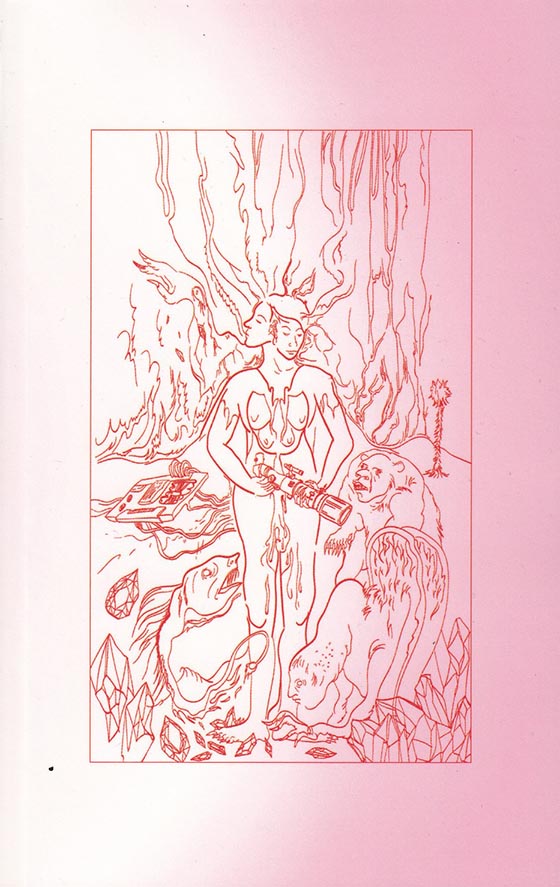
The Blazing World
Published in 1666, The Blazing World stands as one of the first Western works of Science Fiction. In its assertion that all animal flesh is made of rational matter (including that of the female body) Margaret Cavendish wrote the only 17th century text of its kind - a book of gendered natural philosophy.
Caught in frost at the North Pole, Cavendish tells the story of a woman who is saved by crossing over from our world, to a whole new Utopia. Amongst gems and stars she finds a city of half-human half-beast scientists. Worm- Men, Bear-Men, Bird-Men and Fish-Men welcome her to their land. Together they toil in their investigations, describing Nature afresh.
Cavendish predicted motors, submarines and nautical machinery long before these technologies came to exist in the present. As more than just a work of fantastical invention, The Blazing World is important for its portrayal of invention itself. Enlightenment technology is described here as a recourse to protect the world. All of it. The feeling and reasoning matter of all animals, minerals, trees and plants is significant for its proto-environmentalism and for its path-setting form: philosophy as poetry; science as poetry.
With a foreword by Emile Frankel.
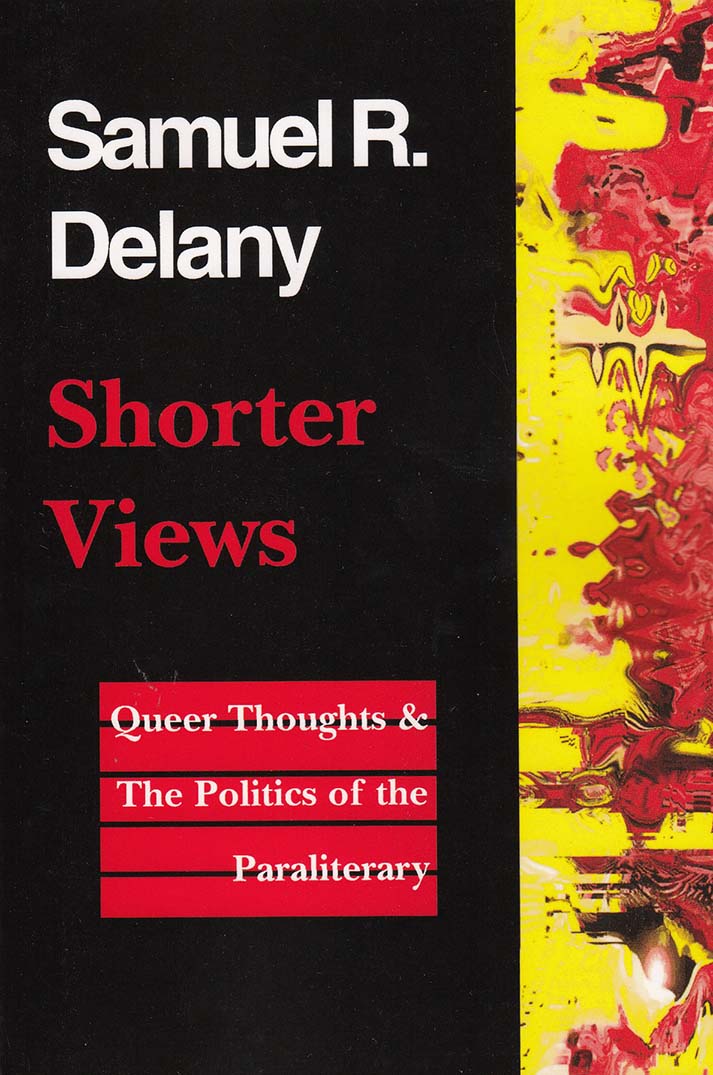
Shorter Views: Queer Thoughts & the Politics of the Paraliterary
In Shorter Views, Hugo and Nebula award-winning author Samuel R. Delany explores the closely felt issues of identity, race, and sexuality; the untangling of the intricacies of literary theory, and the writing process itself. The essays cluster around topics related to queer theory on the one hand, and on the other, questions concerning the paraliterary genres: science fiction, pornography, comics, and more.

Most of my heroes don't appear on no stamps
The poems in Ran Walker's collection use an African-American poetic form called the Kwansaba, which was created in 1995 by Dr. Eugene Redmond. The poems follow a seven-line, seven-words per line pattern with no word more than seven letters (save proper nouns and foreign terms). All language within the form speaks to aspects of African-American history and culture. With these forty-nine poems, each chapter of forty-nine lines, Walker offers profound commentary on a wide variety of topics ranging from interrogations of celebrity culture to issues that speak directly to the Black Lives Matter movement.
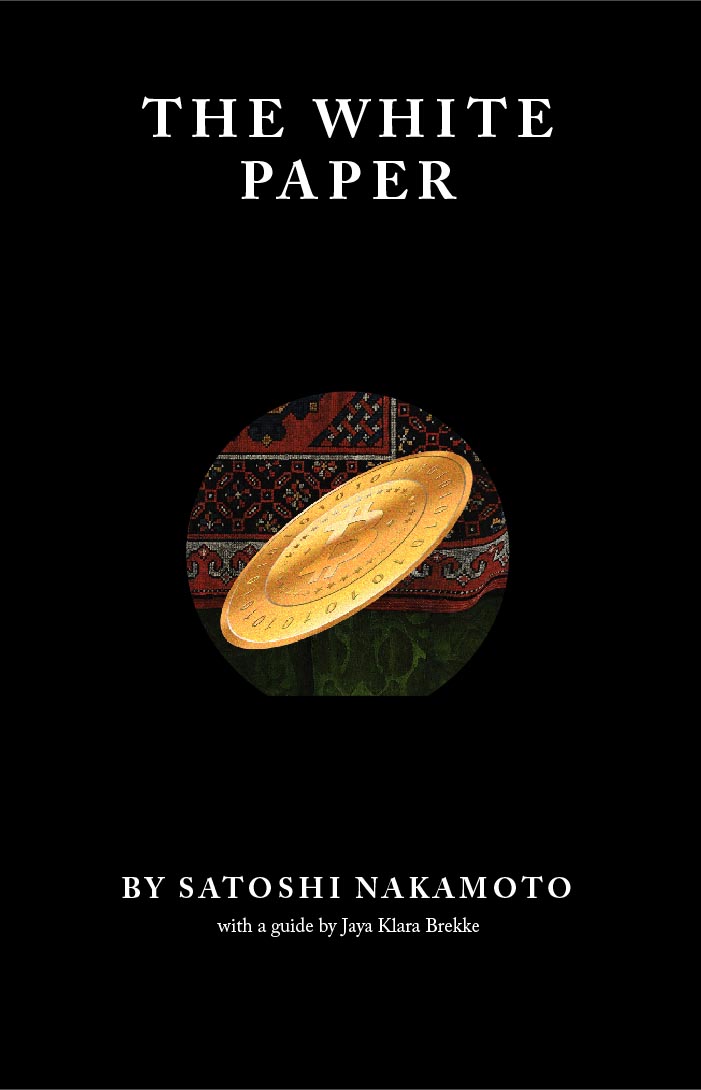
The White Paper
Satoshi Nakamoto, Jaya Klara Brekke
In the wake of the 2008 financial crisis, the mysterious Satoshi Nakamoto published a revolutionary white paper that described a simple peer-to-peer electronic cash system that would later become Bitcoin. In the decade since the launch of the digital currency, the nascent blockchain technology behind Bitcoin has been heralded as having the same radical potential as the printing press or the Internet, in particular presenting extraordinary challenges to traditional banking. Yet the paper contains no reference to existing political ideas, monetary or economic knowledge. So here it is.

Feeling as a foreign language
In Feeling as a Foreign Language, poet and critic Alice Fulton considers poetry's uncanny ability to access and recreate emotions so wayward they go unnamed. How does poetry create feeling? What are fractal poetics?
In a series of provocative, beautifully written essays concerning "the good strangeness of poetry," Fulton contemplates the intricacies of a rare genetic syndrome, the aesthetics of complexity theory, and the need for "cultural incorrectness." She also meditates on electronic, biological, and linguistic screens; falls in love with an outrageous 17th-century poet; argues for a Dickinsonian tradition in American letters; and calls for a courageous poetics of "inconvenient knowledge."
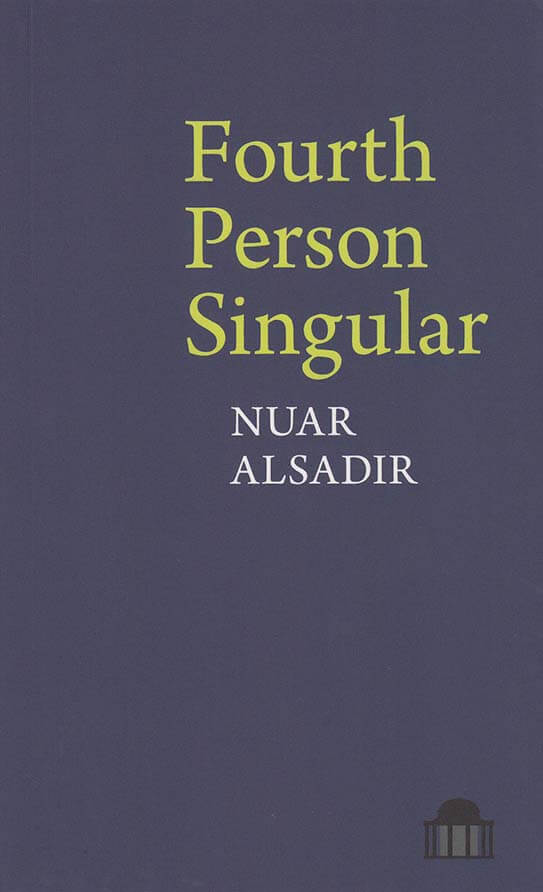
Fourth Person Singular
Fourth Person Singular sets open the relationship between self and world in a working through of lyric shame, bending poetic form through fragment, lyric essay, aphorisms mined from the unconscious, and pop-up associations, to explore the complexities, congruities, disturbances - as well as the beauty - involved in self-representation in language.

Sun of Consciousness
Soleil de la Conscience (Sun of Consciousness) was Martinican philosopher Édouard Glissant's first published work, and opened the Poétique (Poetics) strain of his oeuvre. This book-length essay, which is characterized by its exploratory, intimate character, announces Glissants concerns with créolisation (creolization), mondialité (worldliness, as against globalization), or opacité (opacity) and inscribes in this work a refusal of colonialism and of inverted exoticism. The sense of estrangement experienced by the author who arrives as a "foreigner" in a country to which he is bound by "the first page of his passport" is the author's principal preoccupation. By positioning himself as both different and same, Glissant opens a space for the writing of a(nother) history: that of the Caribbean.
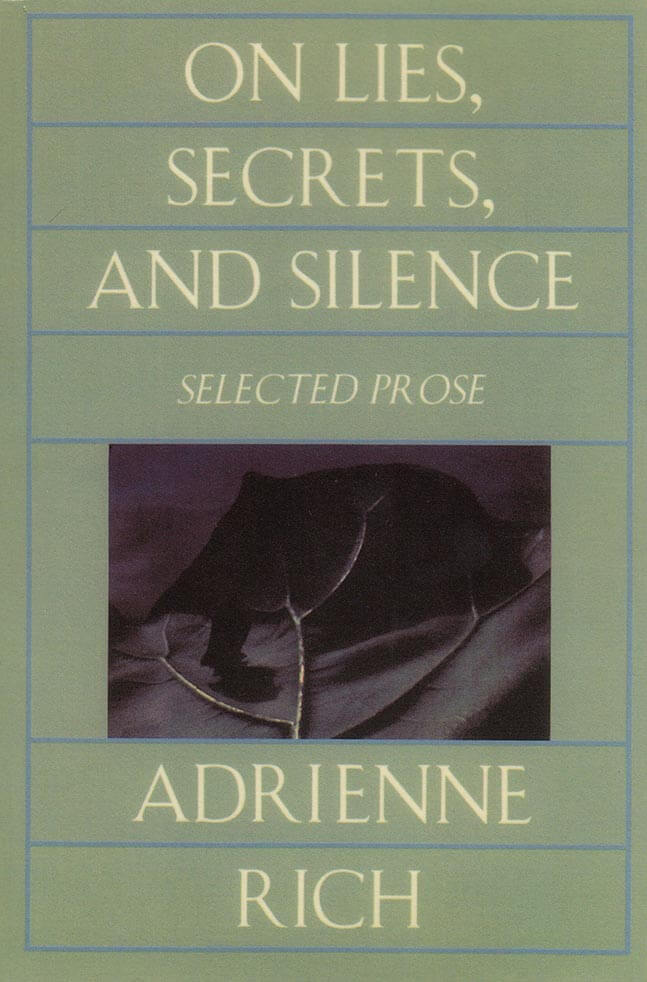
On Lies, Secrets And Silence
Collection of early prose writings by Adrienne Rich. On Lies, Secrets, and Silence is a sort of travel diary, documenting Adrienne Rich's journeys to the frontier and into the interior. It traces the development of one individual consciousness, 'playing over such issues as motherhood, racism, history, poetry, the uses of scholarship, the politics of language.' Rich has written a headnote for each essay, briefly discussing the circumstances of its writing.
Adrienne Rich (1929–2012) was for decades among the most influential writers of the feminist movement and one of the best-known American public intellectuals. She wrote two dozen volumes of poetry and more than a half-dozen of prose. Her constellation of honors includes two National Book Awards, a MacArthur Foundation “genius” grant, and a Medal for Distinguished Contribution to American Letters by the National Book Foundation. Ms. Rich’s volumes of poetry include The Dream of a Common Language, A Wild Patience Has Taken Me This Far, An Atlas of the Difficult World, The School Among the Ruins, and Telephone Ringing in the Labyrinth. Her prose includes the essay collections On Lies, Secrets, and Silence; Blood, Bread, and Poetry; an influential essay, “Compulsory Heterosexuality and Lesbian Existence,” and the nonfiction book Of Woman Born, which examines the institution of motherhood as a socio-historic construct. In 2010, she was honored with The Griffin Trust for Excellence in Poetry's Lifetime Recognition Award.
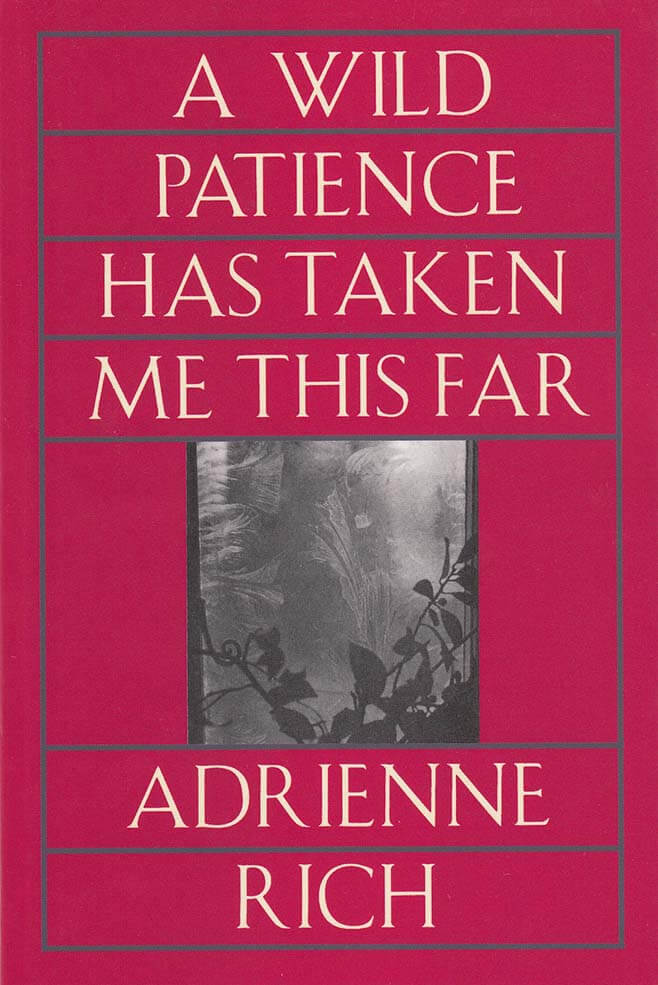
A Wild Patience Has Taken Me This Far
A collection of poems by the amazing Adrienne Rich.
'In this collection, Ms. Rich has shown both a deep knowledge of her subject, women, and a fine mastery of her craft, timeless contemporary poetry. Above all, she has not abandoned the struggle of 'trying to live/ in a clear-headed tenderness' and translating her efforts into critical signposts for those who follow.' - Kansas City Star
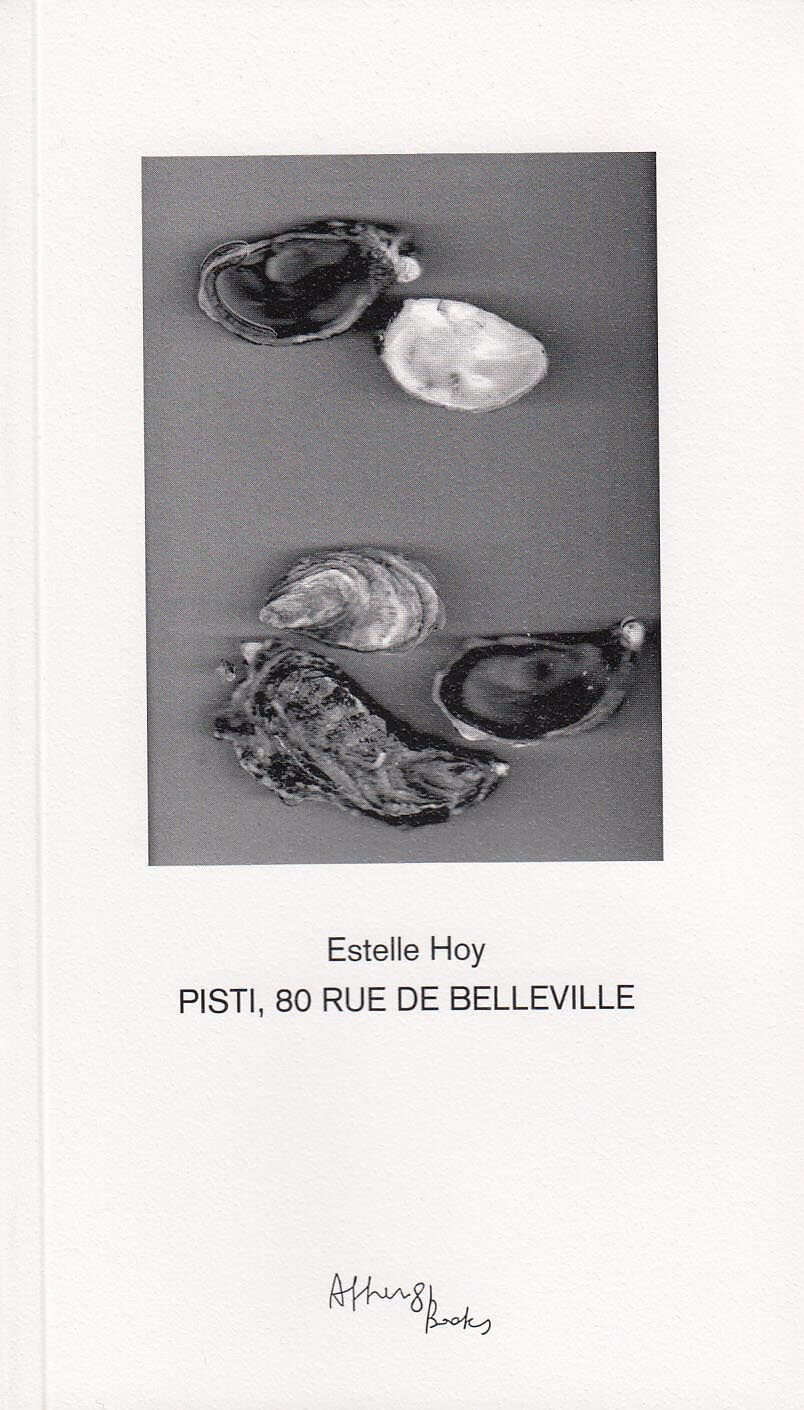
Pisti, 80 rue de Belleville
Pisti, 80 rue de Belleville is Estelle Hoy’s latest novel.
Elke is a young academic with a troubled past that keeps spilling onto her present. Just as she is about to leave town for a writing retreat, she meets Pisti, a charismatic, hard-boiled but luscious Hungarian left activist, who runs an anarchist collective in Paris. Over one night in a Belleville apartment, old friends and new lovers discuss–and act–polyamory, politics, and the art of conversation.
A wry exploration of the seductive allure of tropes and cliché in the art world and politics, Pisti is also an experiment in writing, shamelessly flirting with namedropping and appropriation. The character of Pisti was appropriated from Chris Kraus’ novel Torpor.
Pisti and it's blasphemy against the left and art world is not apostasy, but rather a stepping away from a teleological view of politics and instead, a radical reimagining of the role of incompatibilities, partial identities, cliché and perhaps ultimately, the unresolvedness of hypocrisy. Which is to say, not taking things too seriously, in order to take them seriously. - Estelle Hoy
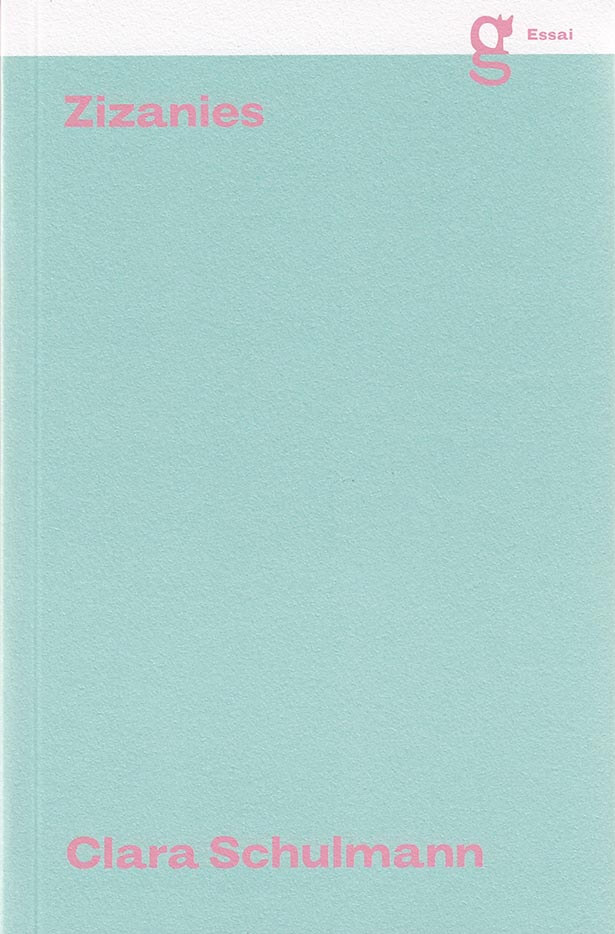
Zizanies
As she tries to collect them for an essay that she is wanting to write, voices begin interfering in Clara’s Schulmann life. Voices of women, heard on the radio, in podcasts, songs, and films; voices of novelists or feminist theorists; voices of friends or of strangers overheard in the street. Like weeds, like bad seeds (what « zizanies » stands for in French), these wayward words invade her thoughts and her life, and the essay that she once had in mind unfolds in a picaresque tale full of twists and turns. Zizanies is a timely and elegant narrative that reveals Clara Schulmann as a new author whose own voice is going to matter in the years to come. (The texts in this book are French only.)